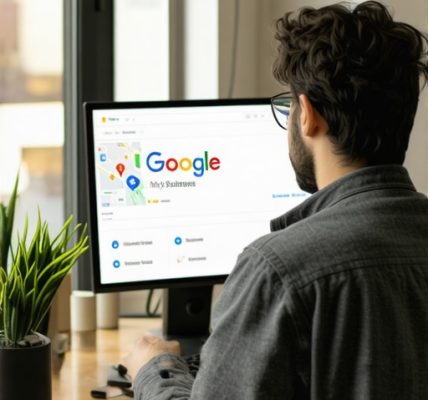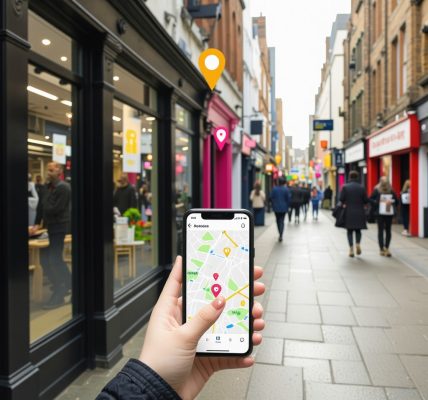Understanding Local SEO and Its Importance
Local SEO is an essential strategy for businesses aiming to attract more local customers through online visibility. In today’s digital landscape, a significant number of consumers rely on search engines to find products and services in their vicinity. By optimizing your online presence for local searches, you can not only enhance your visibility but also drive targeted traffic to your business. This article will explore effective local SEO ranking tips that drive results quickly.
Key Local SEO Ranking Strategies
To achieve better visibility on local search results, here are some actionable tips to implement:
1. Optimize Your Google Business Profile
One of the most critical steps in local SEO is ensuring your Google Business Profile is fully optimized. This includes providing accurate business information such as your name, address, phone number (NAP), and business hours. Additionally, adding photos, services, and engaging descriptions can significantly enhance your profile’s appeal.
2. Utilize Local Keywords in Your Content
Incorporating local keywords into your website content is vital for improving your search ranking. Identify relevant keywords that potential customers might use to find your services and include them naturally in your content, headings, and meta descriptions. This practice helps search engines understand your business’s relevance to local queries.
3. Build Local Citations
Local citations are mentions of your business on other websites, directories, and social media platforms. Ensure your NAP details are consistent across all platforms to improve your credibility and ranking. Utilize expert citation services to manage and enhance your online listings effectively.
4. Encourage Customer Reviews
Customer reviews play a crucial role in local SEO. Positive reviews not only build trust with potential customers but also improve your ranking on search engines. Encourage satisfied customers to leave reviews on your Google Business Profile and respond to reviews to show engagement and appreciation.
5. Create Localized Content
Developing content that is relevant to your local audience can enhance your local SEO efforts. Blog posts, articles, or guides that discuss local events, news, or topics related to your industry can attract local traffic and improve your search rankings.
6. Optimize for Mobile Searches
With the increasing use of mobile devices, optimizing your website for mobile searches is essential. Ensure your site is mobile-friendly, loads quickly, and provides an excellent user experience. This factor can significantly affect your local SEO ranking.
7. Leverage Social Media
Utilizing social media platforms can amplify your local SEO strategy. Share your content, engage with your community, and promote special offers. Active social media engagement can drive traffic to your site and improve your local presence.
Conclusion
By implementing these local SEO ranking tips, you can enhance your business’s online visibility and attract more customers in your area. Always remember that local SEO is an ongoing process, and staying updated with the latest trends and best practices is crucial for sustained success. For more advanced strategies, consider exploring effective GMB ranking strategies to further boost your local presence.
Implementing Local SEO Best Practices
To further enhance your local SEO efforts, it’s essential to adopt advanced tactics that can set your business apart from the competition. By integrating these practices into your strategy, you can significantly boost your online presence and attract more local customers.
8. Utilize Google Posts to Engage Your Audience
Google Posts allow you to share updates, promotions, and events directly on your Google Business Profile. Regularly utilizing this feature not only engages your audience but also signals to Google that your business is active. Craft compelling posts that include relevant keywords and call-to-actions to drive user interaction. This practice can improve your local SEO impact and keep your audience informed.
9. Optimize Your Website for Local Search
Your website should be optimized for local search to enhance user experience and improve rankings. This includes using local keywords in your titles, headers, and throughout your content. Implement schema markup to help search engines understand your business’s location and offerings better. Consider creating a dedicated landing page for each location if your business operates in multiple areas, ensuring each page is optimized for local search.
10. Monitor Your Competitors
Keeping an eye on your competitors can provide valuable insights for your local SEO strategy. Analyze their keywords, content, and backlink profiles to identify gaps in your approach. Tools like SEMrush or Ahrefs can help you track competitor performance and discover new opportunities for your business. Understanding how top competitors rank for local searches can guide you in refining your tactics.
11. Focus on Building Quality Backlinks
Backlinks are a cornerstone of SEO, including local SEO. Building high-quality backlinks from reputable sites can enhance your business’s authority and improve rankings. Engage in guest blogging, collaborate with local influencers, and participate in community events to earn valuable backlinks. Make sure to link back to your Google Business Profile and website in your outreach efforts.
12. Track Your Local SEO Performance
Regularly tracking your local SEO performance is crucial for identifying what works and what needs improvement. Use tools such as Google Analytics and Google Search Console to monitor traffic, keyword rankings, and user behavior. By analyzing this data, you can make informed decisions about your SEO strategies and adjust them as necessary for optimal results.
13. Engage with Your Local Community
Building a strong presence in your local community can significantly enhance your local SEO efforts. Participate in community events, sponsor local sports teams, or collaborate with other businesses to create joint promotions. This not only boosts your visibility but also helps build local backlinks and establishes your brand as a community-oriented business.
Conclusion
Incorporating these advanced local SEO techniques into your marketing strategy will help you stand out in local search results and drive more targeted traffic to your business. Remember, local SEO is not a one-time effort; it requires ongoing attention and optimization. By consistently applying these strategies, you can enhance your online presence and attract more customers. For further insights into local SEO tactics, consider checking out effective local SEO growth strategies to ensure your business thrives in the competitive landscape.
Leverage Local Social Media Marketing
In today’s digital age, social media is a powerful tool for businesses looking to enhance their local SEO. By actively engaging with your audience on platforms like Facebook, Instagram, and Twitter, you can create a vibrant online community around your brand. Share local content, promote events, and interact with your customers regularly. This engagement can lead to increased brand loyalty and drive traffic to your Google Business Profile, ultimately improving your local search rankings.
14. Optimize for Mobile Searches
With the growing number of mobile users, optimizing your website for mobile search is crucial. Ensure that your site is responsive and loads quickly on mobile devices. Google prioritizes mobile-friendly sites in its search results, making this optimization essential for local SEO success. Utilize local keywords and phrases within your mobile content to capture the attention of nearby customers searching for your services.
15. Use Video Marketing for Local Engagement
Video content is increasingly popular and can effectively boost your local SEO efforts. Create engaging videos that showcase your products, services, or customer testimonials. Share these videos on platforms like YouTube and embed them on your website. Not only does video content improve user engagement, but it also increases the time visitors spend on your site, which can positively impact your SEO. Learn more about GMB photo optimization techniques to enhance your video content further.
16. Establish Local Partnerships
Collaborating with other local businesses can be mutually beneficial and enhance your local SEO strategy. Form partnerships with complementary businesses to cross-promote each other’s services. This can include joint events, shared social media posts, or backlink exchanges on each other’s websites. Such collaborations can help you reach a broader audience and improve your online visibility.
17. Implement Localized Content Marketing
Creating content that resonates with your local audience is vital for effective local SEO. Consider writing blog posts or articles that highlight local events, news, or community stories. Incorporate local keywords naturally throughout your content to improve relevance and searchability. Additionally, guest blogging on local websites can help you establish authority in your community and attract more local traffic.
18. Encourage Customer Engagement Through Reviews
Customer reviews play a crucial role in local SEO. Encourage satisfied customers to leave positive reviews on your Google Business Profile and other review platforms. Responding to reviews—both positive and negative—demonstrates that you value customer feedback and care about their experience. This engagement can enhance your business’s credibility and improve your overall search rankings. For more insights on reviews, check out GMB review generation best practices.
Utilize Analytics for Continuous Improvement
Analyzing your local SEO performance is vital for ongoing success. Use tools such as Google Analytics and Google Search Console to track your website’s performance, monitor keyword rankings, and understand user behavior. By regularly reviewing this data, you can identify what strategies are working and where improvements can be made. This data-driven approach allows you to refine your local SEO tactics continuously and stay ahead of your competition.
Monitor Your Competitors
Keeping an eye on your competitors is essential for staying ahead in the local SEO game. Analyze their strategies, including their keyword usage, content marketing efforts, and backlink profiles. Tools like SEMrush and Ahrefs can help you uncover their strengths and weaknesses. By understanding what works for them, you can adapt and implement similar tactics to improve your own Google My Business performance and local rankings.
19. Leverage Google My Business Posts
Google My Business allows you to post updates, offers, and events directly on your profile. Utilize this feature to engage with your audience actively. Regularly posting fresh content not only informs customers about your business but also signals to Google that your listing is active, potentially improving your local search visibility. Ensure you incorporate relevant local keywords in your posts to maximize their impact.
20. Utilize Structured Data Markup
Structured data markup, or schema, enhances your website’s visibility in search results by helping search engines understand your content better. Implementing local business schema can lead to rich snippets, which are more visually appealing and informative. This can significantly boost your click-through rates and overall local SEO performance. For more detailed guidance, explore importance of Google Business optimization.
21. Create Localized Landing Pages
If your business serves multiple locations, consider creating localized landing pages for each area. Tailor the content to reflect the specific services offered in each location and include local keywords to improve searchability. This targeted approach can help capture traffic from various neighborhoods and towns, increasing your visibility across different local search queries.
22. Engage in Local Community Events
Participating in local community events can enhance your brand visibility and encourage local engagement. Sponsoring or attending events allows you to network with other businesses and potential customers. Additionally, these events can lead to valuable backlinks from local websites, which are beneficial for your SEO. Share your experiences on your website and social media to further boost online engagement and local SEO performance.
23. Optimize Your Website’s Loading Speed
A fast-loading website is crucial for user experience and SEO. Google considers page speed as a ranking factor, particularly for mobile searches. Utilize tools like Google PageSpeed Insights to identify areas for improvement. Optimize images, leverage browser caching, and minify CSS and JavaScript to enhance your site’s performance. A quicker site keeps visitors engaged and reduces bounce rates, positively impacting your local SEO.
Stay Updated with Local SEO Trends
The digital landscape is ever-evolving, and so are the strategies for local SEO. Regularly educating yourself about the latest trends and updates in the local SEO space is essential for maintaining a competitive edge. Follow industry blogs, attend webinars, and participate in local SEO forums to stay informed. Adapting your strategies to incorporate new insights will help you refine your approach and achieve sustained success in local search rankings.
Comprehensive FAQ Section on Local SEO
1. What is local SEO and why is it important?
Local SEO refers to the optimization strategies used to improve a business’s visibility in local search results on Google. It is crucial for businesses that serve specific geographic areas, as it helps potential customers find them when searching for relevant products or services nearby. This optimization increases foot traffic, phone calls, and ultimately sales.
2. How can Google My Business improve my local SEO?
Google My Business (GMB) is a free tool that helps businesses manage their online presence across Google, including Search and Maps. By optimizing your GMB profile with accurate information, engaging posts, and customer reviews, you can enhance your visibility in local search results, attract more customers, and improve your overall local SEO performance.
3. What are some effective local SEO strategies?
Effective local SEO strategies include optimizing your Google My Business profile, using local keywords, creating localized landing pages, engaging with your community, and acquiring local backlinks. Additionally, maintaining a responsive website with good loading speed can significantly enhance user experience and search engine rankings.
4. How often should I update my Google My Business profile?
You should update your Google My Business profile regularly to keep your information current and relevant. Post updates about new products, services, promotions, or events frequently to engage your audience and signal to Google that your business is active, which can improve your local search rankings.
5. Can online reviews impact my local SEO?
Yes, online reviews play a significant role in local SEO. Positive reviews can enhance your business’s credibility and attract more customers. Google also considers the quality and quantity of reviews when determining local search rankings. Encourage satisfied customers to leave reviews and respond to them promptly to show that you value customer feedback.
6. What is structured data, and how does it help local SEO?
Structured data is a standardized format for providing information about a page and classifying its content. Implementing structured data markup (schema) for local businesses helps search engines better understand your content, leading to enhanced visibility in search results, rich snippets, and potentially higher click-through rates.
7. Are there any local SEO tools I should use?
Several local SEO tools can help you optimize your strategies, including Google My Business Insights, Moz Local, BrightLocal, and SEMrush. These tools provide valuable insights into your performance, competitor analysis, keyword research, and local listing management.
8. How can I track my local SEO progress?
You can track your local SEO progress by monitoring your rankings for local keywords, analyzing traffic to your website from local search queries, and reviewing your Google My Business analytics. Tools like Google Analytics and Google Search Console can provide valuable data on user engagement and performance metrics.
9. What are some common mistakes to avoid in local SEO?
Common mistakes in local SEO include inconsistent NAP (Name, Address, Phone) information across listings, neglecting customer reviews, ignoring mobile optimization, and failing to keep Google My Business updated. Avoiding these pitfalls can help improve your local search visibility.
10. How important is mobile optimization for local SEO?
Mobile optimization is crucial for local SEO, as many users search for local businesses using their mobile devices. A mobile-friendly website ensures a better user experience, increases engagement, and improves rankings in mobile search results. Make sure your site is responsive and loads quickly on mobile devices.
Authority Resources for Local SEO
To further enhance your understanding and implementation of local SEO strategies, consider exploring the following trusted websites and literature:
- Moz Local SEO Guide – A comprehensive resource for understanding local SEO fundamentals and strategies.
- Search Engine Journal – Local SEO Guide – An extensive guide covering various aspects of local SEO.
- Neil Patel’s Local SEO Guide – Insights and tips from a leading digital marketing expert.
- BrightLocal – Local SEO Learning Center – A hub of resources and guides focused on local search marketing.
- Ahrefs – Local SEO Tips – Practical tips for improving your local search visibility.
- Search Engine Watch – Ultimate Guide to Local SEO – A detailed guide aimed at small businesses looking to improve their local search presence.
Conclusion
In conclusion, mastering local SEO is essential for businesses looking to thrive in their communities and attract local customers. By implementing effective strategies such as optimizing your Google My Business profile, leveraging local keywords, and engaging with your community, you can significantly enhance your local search visibility and overall performance. Stay updated with the latest trends and continually refine your strategies to maintain a competitive edge. Remember, local SEO is not just about improving rankings; it’s about connecting with your audience and building lasting relationships in your local market.




This post offers a comprehensive overview of key strategies in local SEO, which I find incredibly useful as I’ve been trying to improve my business’s visibility in my local community. I especially appreciate the emphasis on maintaining an optimized Google Business Profile and creating localized content, as those have been some of my most effective tactics so far. I’ve also found that actively engaging with customers through reviews not only boosts my credibility but also signals activity to Google, which can positively impact rankings. However, I wonder how small businesses with limited resources can consistently produce relevant local content and gather reviews without it becoming overwhelming. For those of us balancing multiple roles, what are some efficient ways to stay consistent and keep the process manageable? Has anyone here used tools or strategies that made these ongoing tasks easier? Would love to hear experiences or tips that could help streamline local SEO efforts while maintaining quality.